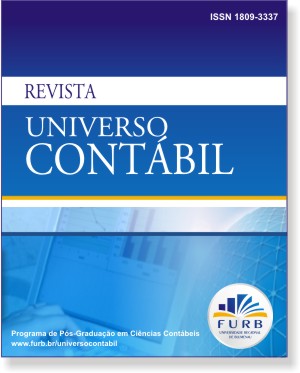ACCOUNTING FRAUD AND WHISTLEBLOWING: AN EMPIRICAL RESEARCH ON THE INFLUENCE OF THE DELATOR’S PERCEPTION OF ACCOUNTING
DOI:
https://doi.org/10.4270/ruc.20139Keywords:
Behavior accounting. Accounting fraud. Delation propensity.Abstract
Corporative fraud is a serious economic and social problem, with adverse efects on various stakeholders and the most important factor to mitigate it is internal delation (whistleblowing). To adress this theme, we examine the influence of employee’s accounting perception on complaint decision. This exploratory field research was implamented in three steps: a) an hipotetic fraud case was adapted from Menk (2011); b) the questionnaire developed by Clikerman e Henning (2000) was used to evaluate accounting perception; and c) the answers were crossed with factor analysis and mean comparison. The result suggests a possible relation between accounting perception and delation propensity, revealing that institutional education on accounting issues may contribute to reduce fraud cases.Downloads
References
AJZEN, Icek.; FISHBEIN, Martin. Understanding attitudes and prediting social behavior. Nova Jersey: Prentice Hall. 1980.
AJZEN, Icek. ;MADDEN, Thomas J. Prediction of goal-directed behavior: Attitudes, intentions, and perceived behavioral control. Journal of Experimental Social Psychology, v. 22, n. 5, p. 453-474. 1986. DOI 10.1016/0022-1031(86)90045-4
ASSOCIATION OF CERTIFIED FRAUD EXAMINERS. Report to the nations on occupation fraud and abuse. Disponível em: < http://www.acfe.com/rttn.aspx>, 2012.
AVAKIAN, Stephanos; ROBERTS, Joanne. Whistleblowers in organisations: prophets at work? Journal of Business Ethics. Edição On line. Disponível em: <http://www.springerlink.com/content/p7l22844565u9025/>, 2011. DOI 10.1007/s10551-011-1148-7
CHIU, Randy K. Ethical judgment and whistleblowing intention: Examining the moderating role of locus of control. Journal of Business Ethics, v. 43, p. 65–74. 2003. DOI 10.1023/A:1022911215204
CLIKEMAN, Paul M.;HENNING, Steven L. The socialization of undergraduate accounting students. Issues in Accounting Education , v. 15, n. 1, p. 1-17. 2000. DOI 10.2308/iace.2000.15.1.1
DAMATTA, Roberto. O que faz o brasil, Brasil? Rio de Janeiro, Rocco, 1986.
ELIAS, Rafik. Auditing students’ professional commitment and anticipatory socialization and their relationship to whistleblowing. Managerial Auditing Journal, v. 23, n.3, p. 283-294. 2008. DOI 10.1108/02686900810857721
FENG, Mei; GE, Weili; LUO, Shuqing ;SHEVLIN, Terry.Why do CFOs become involved in material accounting manipulations? Journal of Accounting and Economics, v. 51, p. 21-36. 2011. DOI 10.2139/ssrn.1260368
DODD FRANK ACT. Disponível em: <http://www.cftc.gov/LawRegulation/DoddFrankAct/index.htm>. 2010.
GAMBAL, Vincent Paul. Public information campaigns: an application of the Theory of Reasoned Action. University of Delaware, Dissertação de mestrado (Artes em comunicação). 1990.
HAIR, Joseph. F.; BLACK, William C.; BABIN, Barry J.; ANDERSON, Rolph E.;TATHAM, Ronald L. Análise multivariada de dados. 6 ed. Bookman: Porto Alegre, 2009.
HOGAN, Chris E.; RAZAEE, Zabihollah; RILEY, Richard A.;VELURY, Uma. Financial statement fraud: Insights from the academic literature. Auditing: A Journal of Practice & Theory, v. 27, n. 2, p. 231-252. 2008. DOI 10.2308/aud.2008.27.2.231
KAPLAN, Steven E. ; SCHULTZ, Joseph J. Intentions to Report Questionable Acts: An examination of the influence of anonymous reporting channel, internal audit quality and setting. Journal of Business Ethics, v. 71, p. 109-124. 2007. DOI 10.1007/s10551-006-0021-6
KARPOFF, Jonathan M.; LEE, D.Scott. ;MARTIN,Gerald S. The Cost to Firms of Cooking the Books. Journal of Financial and Quantitative Analysis, v. 43 , p 581-612. 2008. DOI 10.2139/ssrn.652121
LACERDA, Tales Sarmento. Teorias da ação e o comportamento passado: um estudo do consumidor no comércio eletrônico. Universidade Federal de Minas Gerais (UFMG), Dissertação (Mestrado em Administração), Belo Horizonte. 2007.
LIPMAN, Frederick. D. From Enron to Lehman Brothers: Lessons for boards from recent corporate governance failures. Direct Notes - The conference board, p. 1-7. 2012.
LOEBBECKE, J.; EINING, M.,; WILLINGHAM, J. Auditors' experience with material irregularities: frequency, nature and detectability. Auditing: A Journal of Practice & Theory, v. 9, p. 1-28. 1989.
McLAIN, David. L.; KEENAN, John. P. Risk, information and the decision about response to wrongdoing in an organization. Journal of Business Ethics, v. 19, n. 3, p. 255-271. 1999. DOI 10.1023/A:1006168301995
MENK, Karl Bryan. The impact of materiality, personal traits, and ethical position on whistle-blowing intentions. Virginia Commonwealth University, Tese (Doutorado em Filosofia em Negócios), Richmond. 2011.
MESMER-MAGNUS, Jessica R. ; VISWESVARAN, Chockalingam. Whistleblowing in organizations: An examination of correlates of whistleblowing intentions, actions, and retaliation. Journal of Business Ethics, v 62, p. 277–297. 2005. DOI 10.1007/s10551-005-0849-1
MICELI, Marcia. P. ;NEAR, Janet. P. The relationships among beliefs, organizational position, and whistle-blowing status: A discriminant analysis. Academy of Management Journal, v. 27, p. 687-705. 1984.
_____________________________. Blowing the Whistle: The Organizational and Legal Implications for Companies and Employees. New York: Lexington Books, 1992.
_______________________________. Relationships among value congruence, perceived victimization, and retaliation against whistle-blowers. Journal of Management, v. 20, n. 4, p. 773-794. 1994. DOI 10.1177/014920639402000405
__________________________________. What makes whistleblowing effective? Three field studies. Human Relations, v. 55, n.. 4, p. 455-79. 2002. DOI 10.1177/0018726702055004463
NEAR, Janet P.; MICELI, Marcia P. Organizational dissidence: the case of whistleblowing. Journal of Business Ethics,v.55, n.4, p. 1-16. 1985. DOI 10.1007/BF00382668
NITSH, Detlev; BAETZ Mark; HUGHES, Julia Christensen. Why code of conduct violations go unreported: A conceptual framework to guide intervention and future research. Journal of Business Ethics, v. 57, n. 4, p. 327–341. 2005. DOI 10.1007/s10551-004-8203-6
SABLE, Marjorie R.; SCHWARTZ, Lisa. R.; ELEANOR, Patricia J.; LISBON, Matthew. Using the Theory of Reasoned Action to explain physician intention to prescribe emergency contraception. Perspectives on Sexual and Reproductive Health , v. 38, n. 1, p. 20-27. 2006. DOI 10.1363/3802006
SARBANES-OXLEY ACT. Disponível em: < http://www.soxlaw.com/>, 2002.
WATTS, Ross L.; ZIMMERMAN, Jerold L. Positive accounting theory: a ten year perspective. The Accounting Review , v. 65, p. 131-156. 1990.
Published
How to Cite
Issue
Section
License
The copyright for papers published in this journal belong to the author, with rights of first publication for the journal. As the papers appears in this publicly accessed journal, the papers are for free use, receiving their credit, in educational and non-commercial uses. The journal will allow the use of the papers published for non-commercial purposes, including the right to send the paper to publicly accessed databases.


